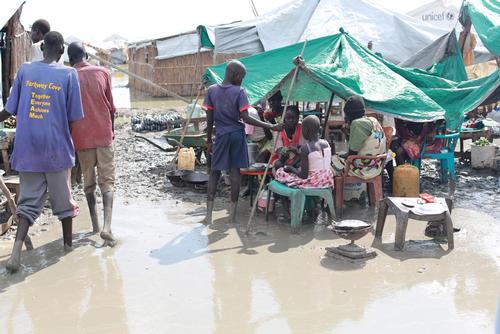This article first appeared in the Huffington Post
MSF Canada’s Executive Director Stephen Cornish recently returned from South Sudan, where he witnessed first-hand the humanitarian crisis currently affecting the world’s youngest country. Over the course of his visit — during which he visited several Protection of Civilian camps managed by the UN's mission in South Sudan (UNMISS), where thousands of people have taken refuge from the violence that has swept across the country since last December
This is one of his journal entries, chronicling his trips to the POC camps in Malakal, Melut and Bentiu, where Médecins Sans Frontières (MSF) is providing healthcare to those trapped inside with nowhere else to go.
In a United Nations base-turned-protection-of-civilians-compound in Bentiu, South Sudan, where tens of thousands of people have been seeking shelter from the violence of the country’s civil conflict since March, the patience of residents is wearing thin. Many feel trapped, and tensions are rising.
The frustrations of the people confined to this base have increasingly turned violent. Five aid workers have been seriously beaten up in recent weeks. Nightly instances of domestic violence have made for a steady stream of late night patients to the emergency room tent being operated by Médecins Sans Frontières (MSF) inside the facility. Camp leaders have been summoned, and all but essential activities have been placed on standby, in order to insist on the protection of humanitarian staff and to maintain the safety of the aid mission itself.
Measles has broken out within the camp, even though a vaccination was done recently by another aid group. A truer indication of the miserable conditions in this supposed humanitarian-protection site is harder to find. MSF’s medical teams, alongside those of other NGOs, have been struggling for months to bring the mortality rates here down below the emergency threshold. In this, there has been some hard-fought success: After weeks in which our water and sanitation teams had to arrange burials outside the camp barricades for four to six dead bodies a day, that number is now down to less than one. Yesterday was one of the first days in recent memory with no one ending up in our hospital’s morgue.
I spent the morning wading in muck up to, and sometimes over, my boots. It is hard to understand how the people here have managed to continue living, breathing and surviving in this sewage-infested swamp over these last difficult months. Medically and psychologically it has taken a heavy toll, witnessed by spikes in respiratory infections and diarrhea cases presenting at our clinic, but also by scores of people with skin lesions from sleeping in filth, or with infected sores and lacerations on their feet and legs from walking barefoot through the endless, opaque brown muck.
Some have indeed seen a return to the conflict zone as the better option, choosing to hide in the bush and risk violent attacks at the hands of opposing armed groups rather than continue to struggle in the camp’s miserable conditions. Some have taken that gamble, but many came streaming back after renewed violent clashes broke out earlier this week in the war zone outside the wire, as both sides of this ongoing conflict vie for control of the nearby environs.
This running of the gauntlet is a common occurrence for people confined to these camps. As in Melut and Malakal, women in Bentiu must often leave the relative safety of the camp in order to collect firewood so they can prepare food for their children. Food distribution here (unlike in other camps I´ve visited in South Sudan) occurs regularly, but is primarily made up of sorghum and lentils — food that must be cooked, yet no charcoal accompanies the distributions. Our teams have been apprised of a number of incidents of sexual violence occurring while women are outside the camp walls, the unacceptable price it seems they must sometimes pay in order to feed their families.
MSF and the other aid actors are doing their best to keep the clean water flowing and the latrines from collapsing. Community health teams are pushing through the camp, doing active case-finding and making referrals. It is a constant struggle, but one that has begun to make a difference.
It is a struggle that continues to rise — like the water level in the swampy camp, like the ire and angst of the displaced population, like the stress and anger of the soldiers outside the wire. Like the cycle of conflict in which this young, fragile nation continues to spin, barely holding itself together. Its people, meanwhile, still dream of peace, even as their collective future teeters dangerously and ever closer to the catastrophic edge.



